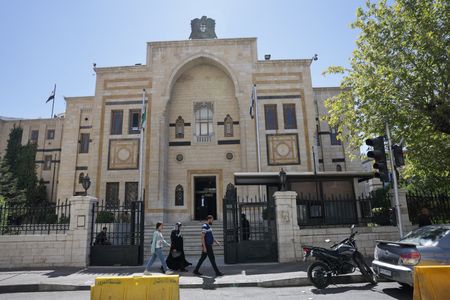DAMASCUS (Reuters) -Syria is preparing to establish the first parliament since Bashar al-Assad was toppled, a milestone in the transition from his rule but one that has stirred new concerns about political inclusivity under President Ahmed al-Sharaa.
Regional committees have selected electoral colleges that will elect two-thirds of the 210-member People's Assembly, on October 5. Sharaa appoints the remaining third.
The authorities say they resorted to this system rather than universal suffrage due to a lack of reliable population data and displacement after years of war.
The process is unfolding as Sharaa tries to consolidate his hold over a fractured nation, with suspicion of his Sunni Islamist-led administration running deep among minority Kurds, Druze and Alawites.
HOW WILL THE ELECTION TAKE PLACE? The process is run by an 11-member body appointed by Sharaa in June. This body in turn appointed regional subcommittees that selected members of regional electoral colleges, after local consultations. A preliminary list of some 6,000 electors has been announced. To run for parliament, you must first be selected as a member of an electoral college.
The criteria rule out supporters of the former regime, and advocates of "secession, division or seeking foreign intervention".
The 140 seats are distributed among 60 districts.
WILL IT TAKE PLACE ACROSS ALL SYRIA?
No. Citing security and political reasons, the authorities have postponed the process in areas controlled by a Kurdish-led administration in the northeast, which differs sharply with Sharaa over how Syria should be governed.
It was also delayed in predominantly Druze Sweida in the south, where tensions remain high following violence that pitted government forces against Druze fighters.
This means that around a dozen seats reserved for these areas will not be filled for now.
WHAT DO CRITICS SAY?
Critics say the process is centralized and the eligibility criteria vaguely defined, among other concerns.
A statement from 15 civil society groups said it opens the way for "the executive authority to dominate an institution that should be independent of it and reflect the popular will".
The Supreme Committee says an appeals process allows people to challenge selections of electors.
Though the rules stipulate that at least a fifth of electors should be women, there is no minimum requirement for their parliamentary representation. Likewise, there are no quotas for ethnic and sectarian minorities.
Combined with a winner-takes-all voting system, the election could produce a result dominated by men from Syria's Sunni Muslim majority, analysts say. This may put the onus on Sharaa, who has repeatedly promised inclusivity, to use his third to appoint female lawmakers and members of minority groups.
Political scientist Radwan Ziadeh described it as a selection process that risked adding to a "crisis of legitimacy" by not providing "true representation". "Critics ... will say this is not democratic, it’s not free, even though the state never claimed it was a democratic process," he said.
The dominant Kurdish groups see the process as further evidence that Damascus wants to monopolize power. Sharaa has rejected their demand for decentralized government.
Thouraya Mustafa of the Kurdish Democratic Union Party (PYD) said it showed the new administration had the same mentality "as the previous authoritarian mentality".
Under Assad, parliament acted as a rubber stamp for his decisions.
WHAT HAS SHARAA SAID?
Sharaa has said the assembly was being formed in "an acceptable way" for a transition, and was "not a permanent state". He said it was impossible to hold a national election due to "the loss of documents", noting many Syrians are outside the country, also without documents.
Sharaa has previously indicated support for democratic governance, telling the Economist in January that "if democracy means that the people decide who will rule them and who represents them in the parliament, then yes Syria is going in this direction".
WHAT POWERS WILL THE PARLIAMENT HAVE?
A temporary constitution introduced in March granted parliament limited authorities. There is no requirement for the government to win a parliamentary vote of confidence.
The Assembly can propose and approve laws. Its term is 30 months, renewable. It assumes legislative authority until a permanent constitution is adopted and elections are organised.
(Reporting by Tom Perry in Beirut, Suleiman al-Khalidi in Amman, Timour Azhari and Firas Makdesi in Damascus and Orhan Qereman in Qamishli; Writing by Tom Perry, Editing by William Maclean)









